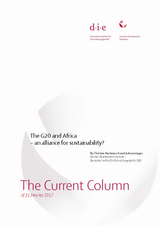The G20 and Africa – an alliance for sustainability?
Hackenesch, Christine / Julia LeiningerThe Current Column (2017)
Bonn: German Development Institute / Deutsches Institut für Entwicklungspolitik (DIE) (The Current Column of 30 January 2017)
Bonn, 31 January 2017. Cooperation with Africa is high on Germany’s agenda for its G20 Presidency. This creates high expectations for Germany and Europe’s future policies on Africa. The arrival of global initiatives for strengthening positive eco-nomic and societal trends in Africa is timely. Mega-trends such as demographic change and urbanisa-tion will have a major impact on sustainable de-velopment on the African continent and throughout the world. What and how much can one expect of the latest initiatives? Through its proposal for a partnership with Africa, the German Presidency is building on a range of initiatives which promise to increase the quantity and quality of cooperation arrangements with Africa. For example, the Chinese G20 Presidency promised support for industrialisation at the Hang-zhou Summit. And the G7 nations agreed measures for food security and health care provision in Africa, though these have been implemented with only limited impact to date. The United Nations, the European Union and the BRIC(S) countries are working to promote sustainable development in Africa. With all the existing initiatives, African governments and the German public are now watching closely to see what added value will be generated by yet another drive in Africa policy. While not part of the G20 agenda, the Cornerstones of a Marshall Plan with Africa recently presented by German Development Minister Müller are serving to increase this interest. The policies of the G20 states directly impact upon sustainable development in Africa and vice versa. Just take a look at climate change or the conse-quences of the financial and economic crisis, for example. Given these interdependencies, it would be better to integrate African perspectives across the G20 working groups rather than relying on individual initiatives and on discussions within the G20 Development Working Group. The use of private investment and infrastructure development to bring about change in economic structures is at the heart of current cooperation agendas. This is a step in the right direction when it comes to working consistently towards sustainable development. Change in economic structures depends on political transformation. If profits from private investment are to make a lasting contribu-tion to increasing social stability and prosperity for the population at large, then we need political distribution mechanisms. Democracies are better able to deliver on a lasting basis economic growth and public goods such as health care for the population. The range of political models among the G20 states means this is no easy task. However, all reform efforts will come to nothing unless the G20 succeeds in integrating economic reforms with broad-based political transformation. The G20 prepares political decisions, but has no institutional implementation apparatus of its own. For instance, it can serve to prepare political agreements in other international forums, such as for the forthcoming Africa-EU Summit in November 2017. If the G20’s sustainable development work with Africa is to be effective, then it is necessary to continue consolidating cooperation between the G20 and African states once Germany’s G20 Presidency has come to an end. Consequently, it is especially important to ensure close coordi-nation with Argentina and - most likely - India, who will succeed Germany as G20 Presidents. Developing mechanisms beyond those of G20 member South Africa to facilitate institutionalised and permanent dialogue between African organisations such as the African Union and the African Development bank is key. Ultimately, the success of recent German initiatives (such as the Compact for Africa), announced by German Finance Minister Schäuble at the G20, and the Marshall Plan with Africa depends upon their close linkage with measures such as the European External Investment Plan. The G20 Presidency should stress the opportunities offered by international cooperation, but also identify clearly its limitations. Germany’s G20 Presidency is having a tremendous effect in regard to raising the profile of the German Federal Government’s policy on Africa. By announcing the Compact for Africa and the development of a Marshall Plan, the Federal Government has created high expectations among partners in Africa and elsewhere. While international trade, finance, devel-opment and security policies can play a key role, the sustainable development of Europe’s neighbouring continent rests primarily in the hands of African governments and societies. Consequently, managing expectations will be a key part of preparations for the G20 initiative, especially with regard to the objectives, feasibility and effects of the German initiatives. The success of these initiatives is dependent upon public communications activities and intensive, high-profile political consultations with African partners. It is necessary to listen to and take account of African interests and priorities at an early stage. If Germany fails to manage expectations, then it risks losing legitimacy in its relations with Africa.



